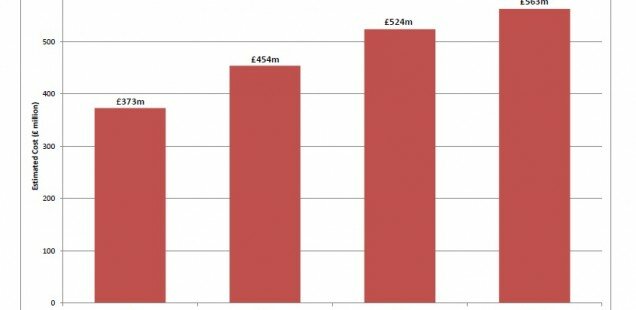
The Games are 50% over budget The Herald reports and the contingency fund is already running low. From an original estimate of £373m in November 2007, the bill for Glasgow 2020 climbed to £454m in November 2009, then to £524m in May 2010, and then to £563m in December 2012, when the security budget was trebled to £90m. Now we hear that the emergency contingency fund is nearing depletion well ahead of the peak spending phase for the Games between April and September this year. Expect considerable rises before all is said and done. The Manchester Commonwealth Games 200 were 120% over budget, the Delhi Games 180% (ten times over budget), and the London Olympics went from 2.4 billion to over £11 billion. No-one can say this comes as a surprise.
£30m of Games contingency fund has already been spent
The Herald, Sunday 9th February
RISING costs at the Glasgow 2020 Commonwealth Games have forced the organisers to spend more than two-thirds of their £42 million back-up fund, raising fears about the final bill for the £563m festival of sport.
Glasgow 2020 last night confirmed to the Sunday Herald just £13.5m of its “general contingency” cash is left.
The Government previously said the money would only be spent if “absolutely necessary”, but almost £30m has now gone because organisers underestimated the time they would need to hire some venues, forcing them to revisit contracts, and because of rising prices for logistics, transport and venue preparation.
First Minister Alex Salmond and others recently told the organisers to get a grip on finances and avoid further use of contingency funds. The spending is well ahead of the peak spending phase for the Games between April and September this year, when the organisers expect to spend half the total budget.
The price-tag on Glasgow 2020, which runs from July 23 to August 3, has already risen by 50% since Glasgow won the bid to host the Games in 2007.
The decision to raid the general contingency fund was taken by the 2020 Strategic Group, the ultimate decision-making body for the Games, chaired by the First Minister and including Glasgow City Council leader Gordon Matheson and Lord Smith of Kelvin, chair of the Glasgow 2020 organising committee.
It agreed last May to use the fund to extend leases on some venues because the original time scales were “insufficient”. In September, the rising cost of contracts for transport and stadium preparations forced another raid on the contingency. And in December, the group ominously noted the pressures on the remaining contingency cash and urged the organising committee “to continue to control pressures to avoid the need to make further calls upon the general contingency”.
Glasgow 2020 last night said it was confident it would stay within budget. But Commonwealth Games have a history of cost over-runs, with the budget for Manchester 2002 rising by 120% and Delhi 2010 by 280%.
From an original estimate of £373m in November 2007, the bill for Glasgow 2020 climbed to £454m in November 2009, then to £524m in May 2010, and then to £563m in December 2012, when the security budget was trebled to £90m.
The budget includes two back-up funds: the general contingency for use in case of cost pressures, which stood at £42.3m a year ago, and an emergency pot of £24m called the Scottish Government special reserve, only to be used in exceptional circumstances with Salmond’s personal approval. This remains untouched.
Around £100m of the £563m bill for Games is to be met from commercial income, including sponsorship, marketing and ticket sales. The rest is for taxpayers to pay, split 80:20 between the SNP Government and Glasgow City Council. In 2010, the Government’s then director of equalities, social inclusion and sport, Liz Hunter, told MSPs: “The contingency fund will be strongly governed and accessed only if it is absolutely necessary for successful delivery of the Games … We are keen to ensure that the contingency and reserve are not used.”
Hugh Henry, Labour chair of Holyrood’s public audit committee, which is tracking spending on the Games, said no-one had told the committee the contingency fund was being spent. He said: “We’ll speak to the Auditor General to see what information she has, then we can go back to the organisers for an explanation.”
Conservative sports spokeswoman Liz Smith said greater transparency was vital.
“This is one of the most important sporting events and everybody wants to see it a huge success, but that can only happen if there’s complete transparency about the organisation and its spending.”
A statement from the Games organisers said: “At the strategic planning stages of the Commonwealth Games … contingency was set at £66m (£42m general contingency and £24m Scottish Government special reserve).
“Now that Glasgow 2020 is in the final and detailed stages of project delivery, contingency spend has been assigned to contracts in areas of operations including overlay and logistics, adding certainty to the delivery of the Games.
“A total contingency of almost £37.5m remains (£13.5m general contingency and £24m Scottish Government special reserve) and the Organising Committee and our Games Partners remain confident that these funds are sufficient to accommodate further planned expenditure as well as deal with any remaining risks or issues which may emerge.”

